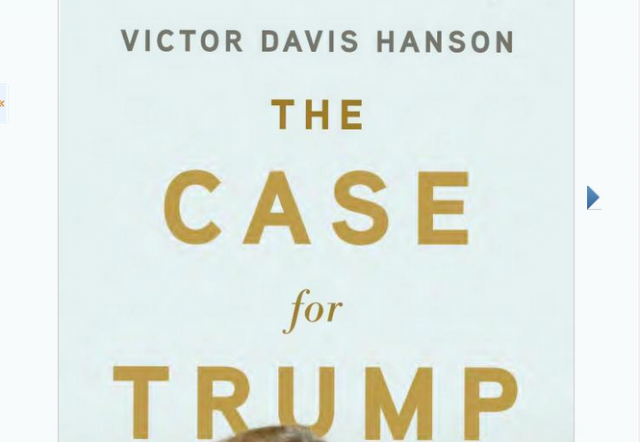Book Review: The Case for Trump
Victor Davis Hanson’s superb look at Donald Trump’s campaign, election, and early presidency

Earlier this month, I noted that Victor Davis Hanson, fellow Californian and a military historian at the Hoover Institution at Stanford University, had been targeted in social media by writers associated with The Bulwark.
His crime? Apparently, it was that Hanson had the temerity to write what he considered to be an even-handed review of President Donald Trump’s first two years in office entitled The Case for Trump. The attack inspired me to purchase the book, and share my thoughts on it with Legal Insurrection.
I have often enjoyed Hanson’s columns on California because they are factual, thoughtful, and filled with references to classic works. The Case for Trump continues Hanson’s tradition of producing engaging and substantive political analysis.
The first part of the book covers the “Two Americas” and Trump’s path to the presidency.
While the rift between Red and Blue America has been covered in a number of other works, Hanson deftly analyzes how Trump took advantage of this division, exploiting it to gain both the Republican nomination and then the Oval Office. Hanson offers a compendium of examples of Trump’s appeal to “flyover country” in a succinct and entertaining matter, and he also notes how Hillary Clinton’s weaknesses as a candidate contributed to the 2016 election results.
There are any number of great passages to quote in The Case for Trump. For reasons that will be obvious to those who follow my posts, this one reviewing Trump’s knack for making those who attack him suffer is particularly savory:
It is hard to calibrate exactly why many of Trump’s targets fared poorly after their encounters with Trump, given the later’s usual greater viciousness. But there was a sort of mummy’s curse that followed his former adversaries long after the fact, as if the instigator of the dispute would not end well.
The second part of the book covers Trump’s time as president grappling with the existing structures of governmental power and coastal elites, which Hanson cleverly dubs The Ancien Régime. Hanson chronicles the lengths to which the Deep State went to reverse the results of the election, and the continuing resistance to the president from the Beltway, Hollywood, and the American press.
It is this second section that The Bulwark took exception to, as Hanson lays out the case for Trump’s economic policy successes, and details other wins for the president as well. However, there is also a look at some of his mistakes:
“What accounted for Trump’s occasional legislative failures?
His past feuding with primary election rivals and present attacks on the anemic Republican congressional leadership (in early 2018, House Speaker Paul Ryan announced his intention to retire from Congress) vitiated any chance that Trump could count on 100 percent support from his Republican contingent. Yet such near absolute fealty was necessary to pass legislation, given Trump’s own failure in his first eighteen months to have achieved, for any sustained period, a 50 percent popularity rating.
I give “The Case for Trump” 5 stars, and I recommend it highly for both the political and historical analysis. Personally, I plan to add some of Hanson’s ancient history books to my collection soon and look forward to what he will write about the remainder of Trump’s time in the Oval Office.
Donations tax deductible
to the full extent allowed by law.








Comments
Good work, Victor. (Nothing we here didn’t already know.)
But perhaps some useful idiot will one day pick up Hanson’s work and read it between eposides of democrat propaganda ‘documentaries’ on Netflix and Amazon.
Victor Hanson Davis is always thoughtful in his analysis. The same cannot be said for those over at The Bulwark–that online rag can’t fold soon enough–from sending nitwit liberals to make fun of prolifers to attacking those who support the President, even when his policy is good–they’re failing in their effort to be the voice of conservatism, assuming they were conservatives to begin with.
All anyone needs to know about The Bulwark is that Bill Kristol writes for then and is apparently a key member of the team. VDH is a National Treasure.
His strongest foes in the republican legislative branch are mostly retired or expired. Hopefully the remaining lying traitors will get the message and stop being obstacles.His base is still there and growing.
I see VDH filling the intellectual void left on the right with the death of Charles Krauthammer. Both have the same calm deliberate manner of speaking and plenty of substance in their writing. One difference would be that VDH sees the crumbling of the GOPe and knows the future of the party lies with Trumpism. I can’t imagine CK ever coming to that conclusion.
One major difference.
CK lived in D.C.
Positions change, principles don’t.
The attacks on Hanson disgrace the attackers.